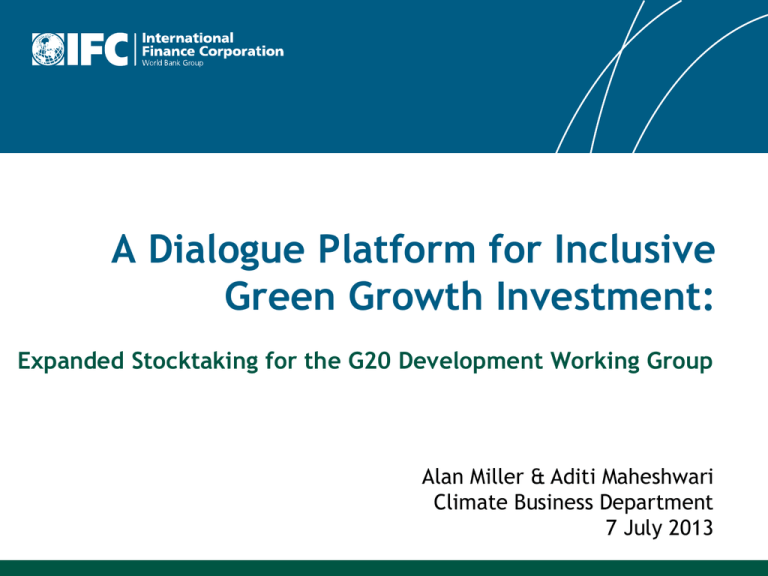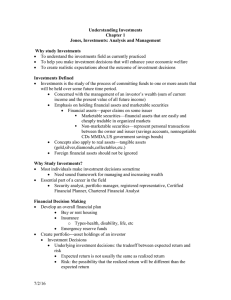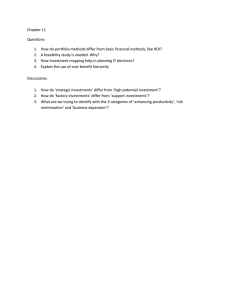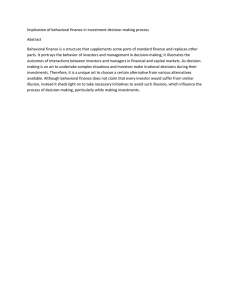A Dialogue Platform for Inclusive Green Growth Investment:
advertisement

A Dialogue Platform for Inclusive Green Growth Investment: Expanded Stocktaking for the G20 Development Working Group Alan Miller & Aditi Maheshwari Climate Business Department 7 July 2013 Stocktaking Overview • IFC asked to expand 2012 stocktaking exercise: provide insights on how the Dialogue Platform on Inclusive Green Investments could engage new stakeholders e.g. institutional investors. 160 publications and documents reviewed and summarized IGG finance flows mapped and sectors, geographies, technologies underserved by private finance identified. 7 case studies providing lessons learned across sectors on structuring investments; addressing barriers; and ensuring a supportive policy and enabling environment. Portfolio analysis on innovative mechanisms to leverage private finance and how to scale them up. Studied initiatives to engage institutional investors to identify best practices and gaps to inform approaches to be adopted by the DPIGI. 2 Constraint: absence of an agreed definition of “Inclusive Green Growth” . • Difficult to track, quantify, and evaluate – and to define asset categories for investment • Broad working definition used in this paper -investments that support economic growth in a clean, resilient and sustainable manner; • “Inclusive” component focuses on base of pyramid (BOP), low-income countries, or such subsets of population within other developing countries. 3 Domestic Finance Dominates Global Historical Clean Energy Investment Flows Source: Green Investment Report: The Ways and Means to Unlock Private Finance for Green GrowthG2A2, (2012) 4 Key Findings • Literature Review: No one-size-fits-all policy prescription Need effective policies to create investment-grade environments / compensate for market failures; Importance of predictability and policy-certainty for investors. • Mapping IGG Finance Flows: Flows not tracked as IGG & difficult to disaggregate due to absence of consistent definitions. Dominant source of funding for green investment is domestic or local finance in all regions; Private sector accounts for the lion’s share of total investments. • Case Studies: While financing is necessary for success, it is often not the primary barrier to greater IGG investment. Poor policies, inadequately proven technologies or business models, or lack of consumer awareness and acceptance may be primary barriers. Local factors and market considerations can make replication and scaling up even successful models complicated, resource intensive, and time-consuming. 5 Key Findings • Understanding Leverage: No universally accepted definition. Development banks can play a significant role in financing green investment and leveraging private sector resources to do so. IFC experience: each dollar it invests leverages over four private dollars. Greater leverage with well-established, lower risk technologies; in newer areas concessional finance can often nudge investment. • Institutional investors: A diverse, highly differentiated group subject to very different regulatory and management environments. Introducing new asset classes or investment themes takes time and resources to overcome perceived risk and embed in decision making process. Most yet to include sustainability and development in investment strategies due to numerous barriers identified – some initial signs of change. While fiduciary duty remains overriding objective some developing country pension funds and their regulators are beginning to be more willing to consider the broader socio-economic context in which they operate e.g. South Africa. 6 Institutional Investors: Decision Making Manage US$75 trillion in assets in OECD alone, yet allocations to direct infrastructure investments are <1%, with green investment even smaller. • Rely on chain of service providers for decision making. • Drivers: fiduciary duty, probability of investment making targeted returns, and function of the investment in balancing the portfolio. • Conservative: seek large, low-risk, liquid, long-term investments that deliver steady income streams matched to their liabilities. • Requires a clear pipeline of investable products. 7 Sustainability Needs to be an Integral, Targeted Part of Financial Investment Strategies Source: Returns in Low-yield times: Alternatives for returns in a low interest rate environment, Allianz Global Investors, 2013 8 Barriers to Investment • Lack of an economic business case • No material weight (if any) on “inclusive” • Inconsistent terminology used • Policy uncertainties • Developing country risks • Lack of track record • Liquidity concerns • Investment time horizons 9 Domestic and South-South Investing Offers Opportunities Top Pension Funds Assets by Regions (2006 – 2011) in US$ billions Source: OECD Pension Markets in Focus http://www.oecd.org/daf/fin/private-pensions/PensionMarketsInFocus2012.pdf 10 Mapping Progress by Investor Initiatives Toward Filling Gap Between Investor Interest and IGG Investment Needs 11 Broad Framework Objectives for the DPIGI Key Objectives 1. To fundamentally change the investor mindset from “green investments lose money” to “the transformation to a green economy presents opportunities and is fundamental to preserve long-term economic growth.” 2. To increase investor support for industry initiatives that call for the policy and regulatory change needed to support inclusive green investments. 3. To encourage effective government action on policy and regulatory changes that will drive investments that support inclusive green growth. 4. To build or catalyze global platforms to facilitate IGG investment and ensure that capital is deployed efficiently (with minimal transaction and agency costs) and at the scale necessary to meet the challenge. Issues for Possible Exploration by DPIGI • Exploring initiatives most likely to address BOP and IGG issues: The case studies – new technologies, new business models, and information provision – all have precedents in developed countries but relevance for the developing world, especially, least developed countries. • Scaling up existing activity: Green investment is currently taking place within existing policy frameworks and without special incentives. These activities provide a baseline for short-term opportunities to scale-up. • Tapping the institutional investor community: Change investor mindset recognize green investment is fundamental to preserving long-term economic growth. Call for policy & regulatory change to support investor initiatives and facilitate the efficient deployment of capital for green investments. • Shifting metrics of financial return to development dividends: Financial returns omit many broader and longer-term development considerations. How can the two be combined to the benefit of all? 13




